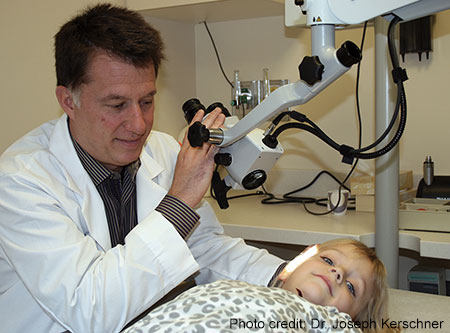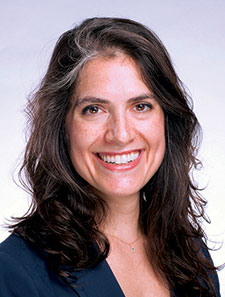
Aside from his extensive and ongoing leadership roles, Dr. Kerschner had a successful career as a clinician.
If it succeeds in humans—and we have every reason to believe it will—it could fundamentally change how we treat middle and inner ear diseases like otitis media. That’s the core focus of my lab’s work, and what we are continuing to pioneer as we have spun out a company, OtoNano, LLC.
Explore This Issue
August 2025Dr. Rapoport: Wow. This is thrilling! It’s remarkable to hear how, over the course of your career, you’ve taken an idea from the research bench and transformed it into a tangible therapy with the potential to dynamically improve patient care.
I’m curious—alongside your work as a scientist and clinician, how did you also come to serve as a medical school dean and provost for 14 years? And how does it feel to transition away from those roles into healthcare consulting? It’s a rare and fascinating blend of jobs.
Dr. Kerschner: That’s a very astute question. It feels like a profound opportunity for me to be able to parlay 20-plus years of health system and medical school leadership to take it to other health systems and medical schools through my consulting work.
I never set out to pursue high-level leadership roles. When I completed my pediatric otolaryngology fellowship, I was primarily focused on research—I even received my first small grant while I was still a fellow. From residency through early faculty, I was committed to the academic pathway.
In fact, if you had asked me in 1998, when I joined the Medical College of Wisconsin (MCW) as junior faculty, what my goals were for my career, I would’ve said to someday become chief of pediatric otolaryngology. That would’ve felt like a fulfilling career—taking care of patients, running a successful lab, and maybe seeing my bench research reach the bedside.
But leadership for me unfolded in three ways. First, I’ve always been drawn to it. When opportunities arose and were presented to me, I always chose to step forward into the role rather than to step aside. I made these decisions knowing they would likely logistically complicate my life and also knowing that they could offer me growth.
Second, very early on in my career, some chance opportunities transpired—whether serendipity or preparation, I’m not sure, but I was available to “say yes” to these opportunities in those moments. I will tell you about that.
And third, I think part of it was embracing the idea: Could I lead? Would I? And I suppose I had that phenotype. I’d held leadership roles in high school and college, and I was student government president in medical school—I’ve always been drawn to leading and helping others grow.
Dr. Rapoport: Can you give an example of how that combination you describe—of curiosity, readiness, and a willingness to “say yes”—shaped your career in a way you couldn’t have predicted?
Dr. Kerschner: Absolutely. Early in my faculty career, the chief of pediatric otolaryngology left our department. And no one was interested in taking over his role. The department chair at the time asked if I’d step in as division chief, and I said yes, without fully knowing what the job would entail, but at the same time, I was eager to learn. That one decision ended up opening a door to leadership for me in significant ways. I started attending meetings I otherwise wouldn’t have been invited to, and slowly, new opportunities began presenting themselves to me.
As division chief, I had the opportunity to join the board of our pediatric faculty practice plan—and I was the youngest member of the board at the time by far. Then, when the CEO of that practice plan stepped down, several colleagues encouraged me to apply for his job, so I did. Then, when the dean of MCW stepped down, the president approached me to serve as interim dean. I was 45 years old then and thought it was a wild idea—I’d be almost a decade younger than most other deans. But he reassured me that I was trusted by my colleagues, so I accepted. Eventually, he asked me to take on the permanent role, and at 46 years old, I said yes, and I became the youngest medical school dean in the country. It was an exciting opportunity, but I knew I would have a lot to learn.
Dr. Rapoport: Given all you’ve accomplished as a pediatric otolaryngologist and scientific researcher, how has your approach to failure evolved over time—shifting from something that could discourage you to something that now helps drive your progress and success?
Dr. Kerschner: I’d answer this in two ways. First, you can’t fear failure. If you’re not experiencing it, you probably aren’t pushing yourself to your fullest potential. Failure, by its very nature, makes you stronger, wiser, and more resilient. Experience is built on learning from your failures. While successes are important, if you’ve never failed, you haven’t truly tested your limits. Over time, I’ve learned to view failure as a guide, showing me where to focus my energy and effort to grow and improve.
Second, I have two daughters who are currently in residency, and through our conversations, I’ve been reflecting on “impostor syndrome”—a phrase I didn’t hear when I was their age but now see often. Although I didn’t know the term early in my career, I certainly felt it! It’s a feeling many of us experience, especially when stepping into leadership. And the truth is, I don’t think it ever fully goes away. But the key is how you manage it. My advice to them and younger otolaryngologists is to understand that failure is a natural part of leadership. Every successful leader has faced failure, sometimes dramatically, and that’s okay. What matters is your willingness to rise from it, learn, and keep going.
For those aspiring to leadership, especially at higher levels, my most important piece of advice is: Never, ever compromise your “true north.” No matter how much you care about a job, don’t lose sight of your core values and principles. You won’t always have all the answers, but you must stay aligned with what you believe is right. Leadership is about staying true to your vision, even when the path is uncertain.
I believe that when you lead with integrity and resilience, embracing both success and failure, you create the foundation for not just personal growth but also inspiring those around you to do the same.
Dr. Rapoport: Thank you so much, Dr. Kerschner.
 Dr. Rapoport is an attending physician in otolaryngology/head and neck surgery at the Veterans Affairs Medical Center and an assistant professor at Georgetown University in the department of otolaryngology, both in Washington, D.C.
Dr. Rapoport is an attending physician in otolaryngology/head and neck surgery at the Veterans Affairs Medical Center and an assistant professor at Georgetown University in the department of otolaryngology, both in Washington, D.C.
Leave a Reply